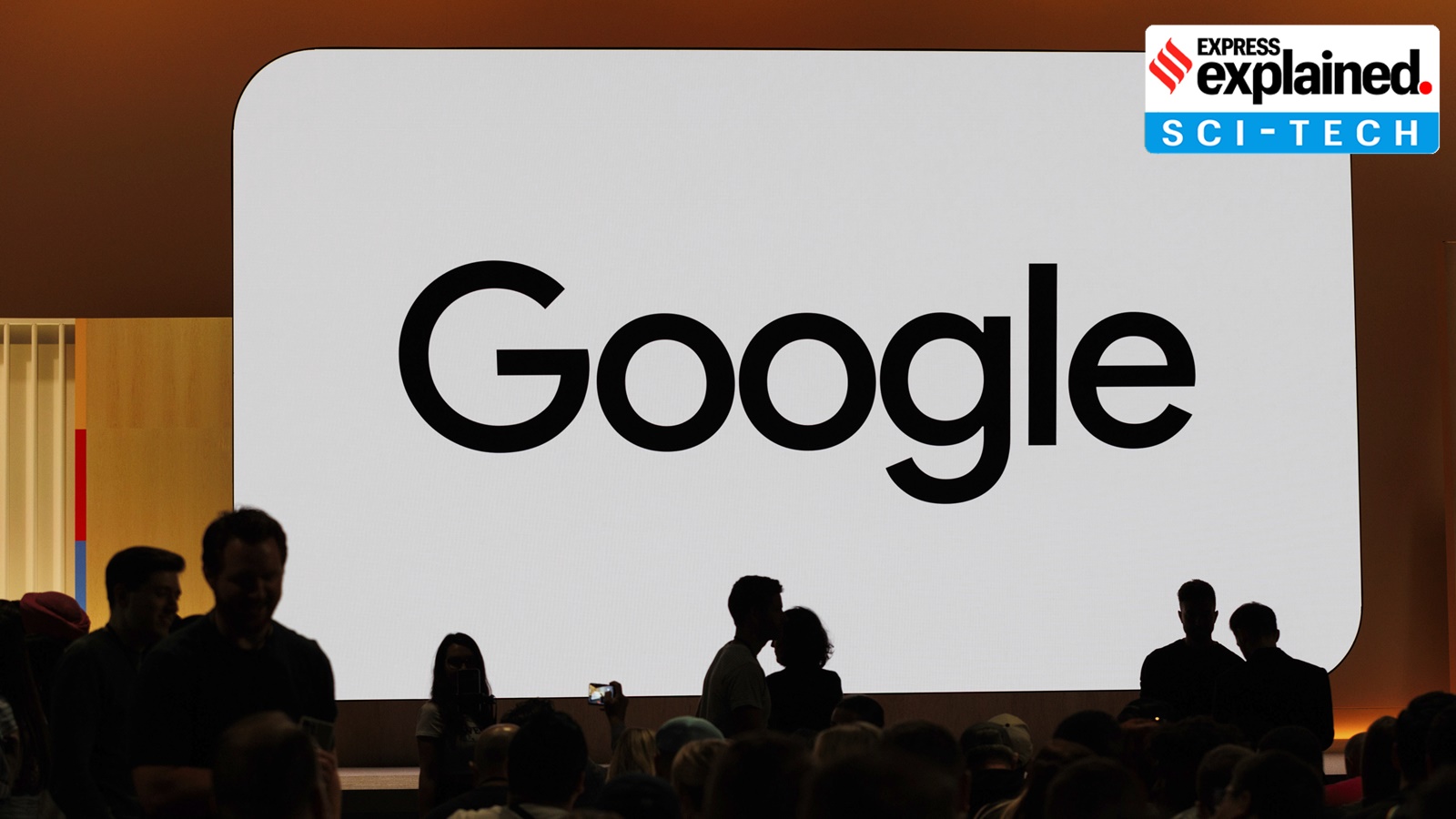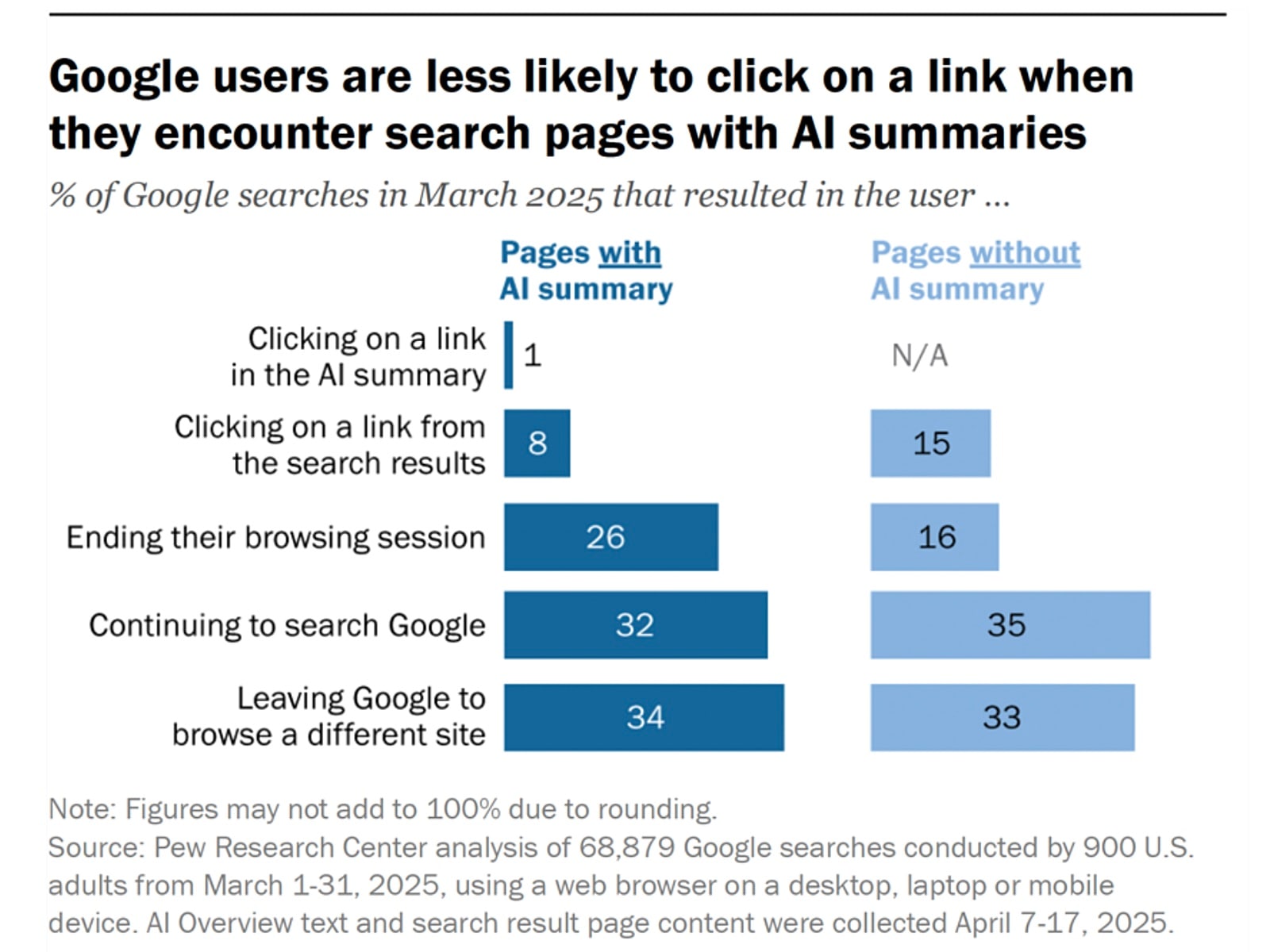As Google transitions from AI Overviews to AI Mode, which seeks to replace traditional search results altogether and instead a chatbot effectively creates a miniature article to answer a query, the big looming question is — will this change the way people surf the internet?
No, claims Google, but its own AI bot Gemini disagrees, saying that there is “significant evidence” to show that AI Overviews — a feature that displays an artificial intelligence-generated result summary at the top of many Google search pages — are hurting website traffic, especially for organic listings.

That is now corroborated by a small-sample study conducted by Pew Research. Earlier this year, 900 web-surfing Americans agreed to share their online browsing activity with the Pew Research Center. About six-in-ten respondents (58%) conducted at least one Google search in March 2025 that produced an AI-generated summary. This could be even more consequentual as Google recently launched a feature called AI Mode in the American market, which effectively gets rid of traditional search results entirely. Google plans to progressively move from Overviews to AI Mode.
In response to a query by The Indian Express, a Google spokesperson said the Pew study uses “flawed methodology”. “People are gravitating to AI-powered experiences, and AI features in Search enable people to ask even more questions, creating new opportunities for people to connect with websites. This study uses a flawed methodology and skewed queryset that is not representative of Search traffic. We consistently direct billions of clicks to websites daily and have not observed significant drops in aggregate web traffic as is being suggested,” the search giant’s spokesperson said.
Findings from the Pew study
The analysis found that Google users were less likely to click on result links when visiting search pages with an AI summary compared with those without one. For searches that resulted in an AI-generated summary, users very rarely clicked on the sources cited.
* Google users who encounter an AI summary are less likely to click on links to other websites than users who do not see one. Users who encountered an AI summary clicked on a traditional search result link in 8% of all visits. Those who did not encounter an AI summary clicked on a search result nearly twice as often (15% of visits).
* Google users who encountered an AI summary also rarely clicked on a link in the summary itself. This occurred in just 1% of all visits to pages with such a summary.
Story continues below this ad
 Source: Pew Research
Source: Pew Research
* Google users are more likely to end their browsing session entirely after visiting a search page with an AI summary than on pages without a summary. This happened on 26% of pages with an AI summary, compared with 16% of pages with only traditional search results.
* Regardless of whether a page had an AI-generated summary or not, the largest share of Google searches in the Pew Research study resulted in the user either browsing elsewhere on Google or leaving the site entirely without clicking a link in the search results. Around two-thirds of all searches resulted in one of these actions.
* The most frequently cited sources in both Google AI summaries and standard search results are Wikipedia, YouTube and Reddit. These three sites are the most commonly linked sources in AI summaries and standard search results alike. Collectively, they accounted for 15% of the sources that were listed in the AI summaries examined in the study. They made up a similar share (17%) of the sources listed in standard search results.
Last year, Google had signed a content licensing deal with Reddit worth $60 million to gain real-time access to the data of one of the world’s most visited social media and content-sharing platforms.
Story continues below this ad
 Source: Pew Research
Source: Pew Research
* The typical (median) AI summary in the study was 67 words long, but this varied widely. The shortest was just seven words long, while the longest ran to 369 words.
* Google searches that contain more words, ask questions or use full sentences tend to produce AI summaries more often. Longer searches are more likely to produce an AI summary. Just 8% of one- or two-word searches resulted in an AI summary. But that share rose to 53% for searches with 10 words or more.
* Searches that form questions: 60% of search queries that began with question words such as “who,” “what,” “when” or “why” resulted in an AI summary.
Searches that use full sentences: 36% of searches that include both a noun and a verb generated an AI summary.
Story continues below this ad
Google did not respond to an immediate response for comment. While announcing the AI Overviews feature in India last month, Google had said the feature was being used by over 1.5 billion users every month, and in its biggest markets like the US and India, it was already driving a more than 10% increase in usage for the types of queries where they appear.
Why AI overviews are hurting website traffic
There is significant evidence and industry consensus that Google’s AI Overviews are hurting website traffic, particularly for organic listings. Here’s a breakdown of why and what the implications are:
AI Overviews aim to provide immediate, comprehensive answers directly on the search results page, with the result that users often find the information they need without ever clicking through to a website, leading to a “zero-click” search. Studies from SEO tool providers such as Amsive and SurferSEO seems to suggest quantifiable declines in click-through-rates for traditional organic listings when AI Overviews are present.
AI Overviews appear at the very top of search results, often pushing organic listings further down the page, sometimes entirely below the fold, which reduces visibility, leading to fewer clicks. AI Overviews synthesise information from multiple websites, repackaging it into a snapshot. While they include citations, the key points are often extracted and displayed upfront, reducing the need for users to visit the source.
Story continues below this ad
Multiple industries, including fashion, travel, DIY, and cooking, have reported significant traffic declines. Also, non-branded, informational queries are much more likely to trigger AI Overviews and experience the largest CTR drops, as comapred to more specific, branded searches. That could possibly change with AI Mode.



 Source: Pew Research
Source: Pew Research Source: Pew Research
Source: Pew Research





































